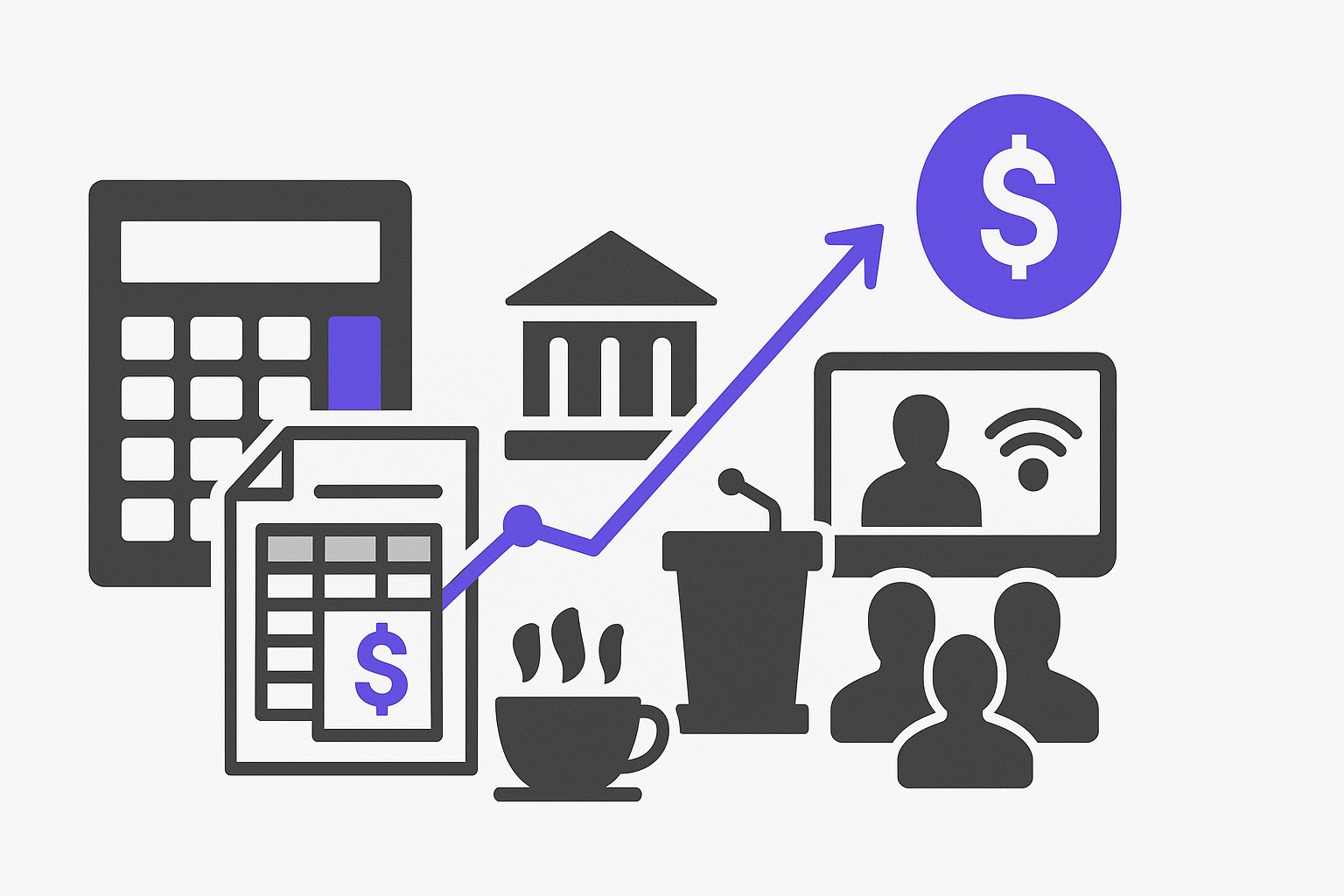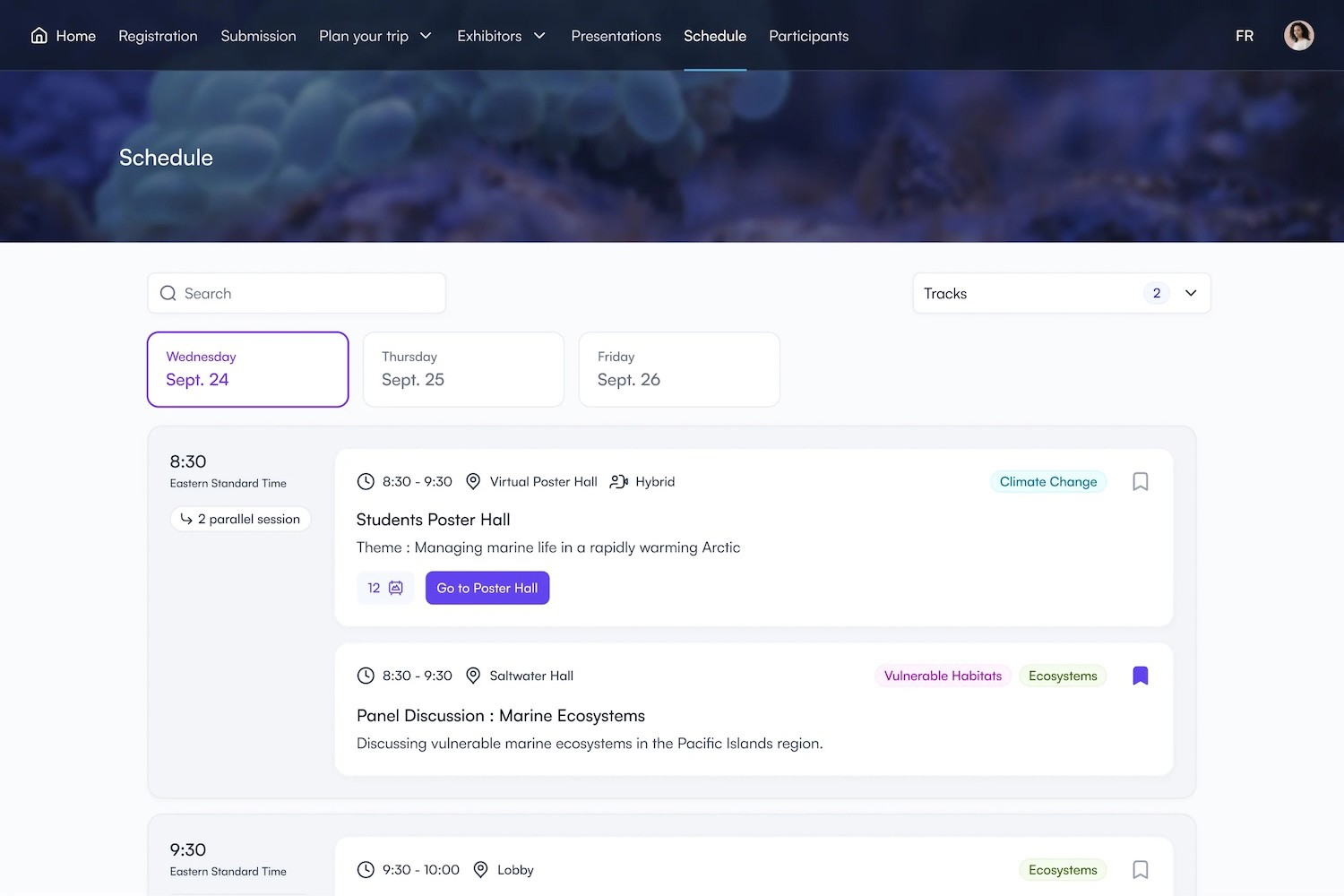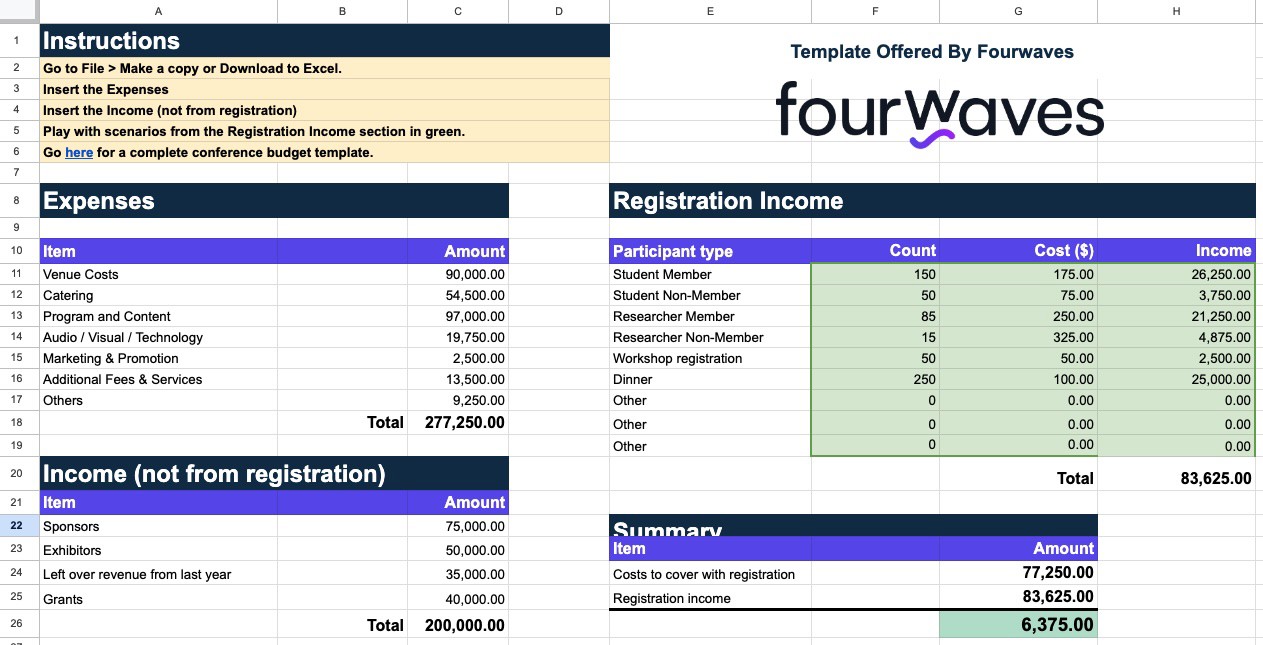How Much to Charge for an Academic Conference (with Template)
With prices rising on everything from transportation to food to manufactured goods and with new virtual event formats, many event organizers are rethinking their pricing strategies, to maintain accessibility while not incurring losses.
Setting prices is one of the most important decisions academic conference organizers have to make.
For all conferences, there are two factors to consider, the conference costs you will incur by hosting the event, and the revenue you plan to generate. Every cost and revenue generated should be tracked in your event budget and communicated with your organizing committee through regular updates.
In this article, we will dive into the details of both conference costs and revenue and provide a method to help you determine how much you need to charge participants for your academic conference. An accompanying Excel spreadsheet Template is also provided for free.

Download The Template
Download the Google Sheet template that will help you test diffevent scenarios (no email required) through the link below.
Test different registration costs to figure out how much to charge.
4 Steps to Determine How Much to Charge For Your Conference
Follow the steps below.
Step 1. Estimate Your Expenses
The first thing that any conference organizing committee needs to do is calculate the average costs associated with hosting the conference.
To do that, bring together each chair of your event committee, with specific focus on the finance chair. Each should be prepared with a list of expenses they expect to incur throughout the event planning process.
Before these expenses can be estimated, it’s important to know whether the event will be in-person, virtual, or hybrid as event costs will vary significantly based on the chosen format.
Venue Costs
When choosing your event venue, it’s important to know what the rental includes. On top of the fee for renting the space, does the venue charge extra for audio/visual equipment like speakers, microphones, projectors, screens or are these included in the price? Does the venue provide tables, chairs and podiums, or are these items that you’ll need to rent separately?
Knowing if you’ll have parallel tracks will be helpful as the cost can double if you have two parallel tracks.
Food and Drinks
Most in-person events provide a refreshment table with coffee, tea and baked goods in between sessions. Some offer a selection of food and drinks for lunch as well. Check with your venue to see if this can be included in the venue rental. They often have preferred suppliers and costs.
Poster Sessions or Networking Activities
One of the main reasons that researchers attend academic events is the networking opportunities they provide, including poster sessions. In-person networking sessions usually mean additional costs for poster boards, refreshments, giveaways or transportation.
Conference Software

Before choosing a software, talk with your committee members to find out what functionalities you will need. A registration system only? Abstract management with or without peer-review? An event app? An event website?
Avoid paying for multiple platforms by selecting an all-in-one solution like Fourwaves. It will provide a coherent experience for participants, speakers, reviewers and organizers.
It includes features for publishing an event website, collecting registration and payments, managing abstract submissions, peer-reviews, publishing a program, sharing presentation materials and posters, email communication and more. It also includes everything you need to run a virtual event including virtual poster sessions.
Good software that is reliable, easy-to-use and multi-purposed will make a difference down the road.
We can help you make the right decision.
Other Costs
Consider other elements like conference travel, particularly for international conferences, such as speaker transportation (airfare), lodging, on-site staff, printed materials (conference proceedings and name tags) How many days is the conference? (A 2-day conference can double the costs), will you do social media marketing, ads? etc.
A more complete list of costs with an Excel template is available in the Conference budget template article.
Step 2. Estimate Your Income (excluding registrations)
The second step is to calculate the expected revenue from sources that exclude the conference registration fees. There are a few sources for this, detailed below.
Sponsorship Revenue
Sponsorship revenue can be a big help in covering the costs you incur and potentially generating a profit, depending on your overall goals.
Approaching potential sponsors early on in your planning process will help give you a reasonable estimate on the amount of sponsorship revenue you can expect, which is an important piece of information needed to set your registration fees.
Exhibitors
Exhibitors are another source of revenue. Make sure to consider them as well.
Leftover Funds and Grants
If this isn’t the first year you’ve hosted this event, like an annual conference, there may potentially be funds remaining from last year that have not yet been spent. These can contribute to the revenue section of your conference budget and help offset some of the new expenses.
Grants are also a possible income so make sure to look at all possible options.
Step 3. Calculate The Amount Registrations Need to Cover
Take all your costs and subtract the revenue sources excluding revenue from registration. This is the net amount registrations need to cover.
You can divide by the number of participants expected to get the average revenue per participant.
Step 4. Test Different Registration Income Scenarios
In practice, it’s a bit more complex than simply dividing the cost to cover by the expected number of participants. There are a few things to consider while testing your scenarios.
First, you will likely have less expensive registration tiers (eg. students, low income countries), etc. You can rely on similar conferences with similar program to estimate a reasonnable cost to charge. You might charge for one day, or full-conference. You will also have paid options like dinners, social activities, workshops, which can have a maximum capacity and uncertain attendance.
Second, the number of attendees in each category will be unknown until registration ends. Some events do a survey or preregistration to know how many want to participate in each category.
Third, the financial goals of your committee should be considered. Are you attempting to make a profit or simply to break even?
A few marketing tactics can boost registrations and impact the registration rates.
- Early bird discount: You can discount the price of tickets for people who register sooner than most.
- Non-member VS member price: You can have a member registration fee which would be lower than the non-members of your association, academia, university and such.
- Last-minute deals: Just before the end of registration you can offer a discount which would reduce the registration fees but boost registrations.
How to Use Our Free Excel Template
To help you, we created a simple Excel template. This is not meant to be a complete conference budget template, but a sandbox to play around and evaluate different scenarios.
Click this link and create a copy.

List Expenses
On the left section all costs.
List Income (Not From Registrations)
List any income source that are not from registration (sponsors, exhibitors, grants, etc.)
Test Cost Scenarios
This is where the fun begins, enter the number of attendees for each category, specify a cost. You can also specify income from workshop registration, dinners etc.
See If It Works
The summary section shows you the costs that need to be covered by the registration fee as well as the registration revenue and the net amount (in green if positive, otherwise in red).
Play with different costs to see what works.

Test different registration costs to figure out how much to charge.
Conclusion
While there’s no clear-cut answer to the question of how much to charge researchers to participate in your conference, we hope this article helps you determine the steps you need to take in order to set a reasonable registration fee that will encourage participation while meeting your financial obligations.
Feel free to contact us if you have any questions and to share this resource with your colleagues.


